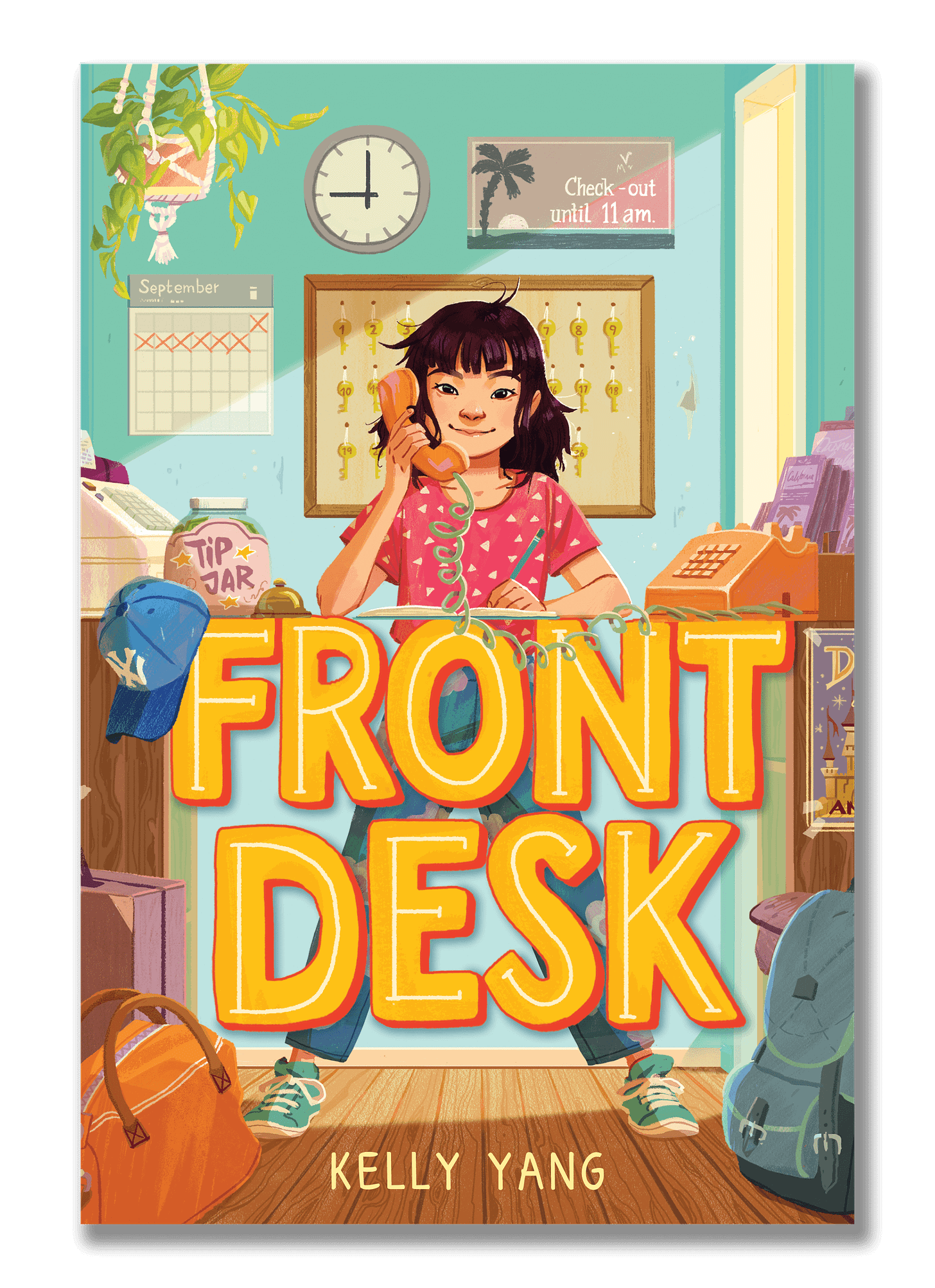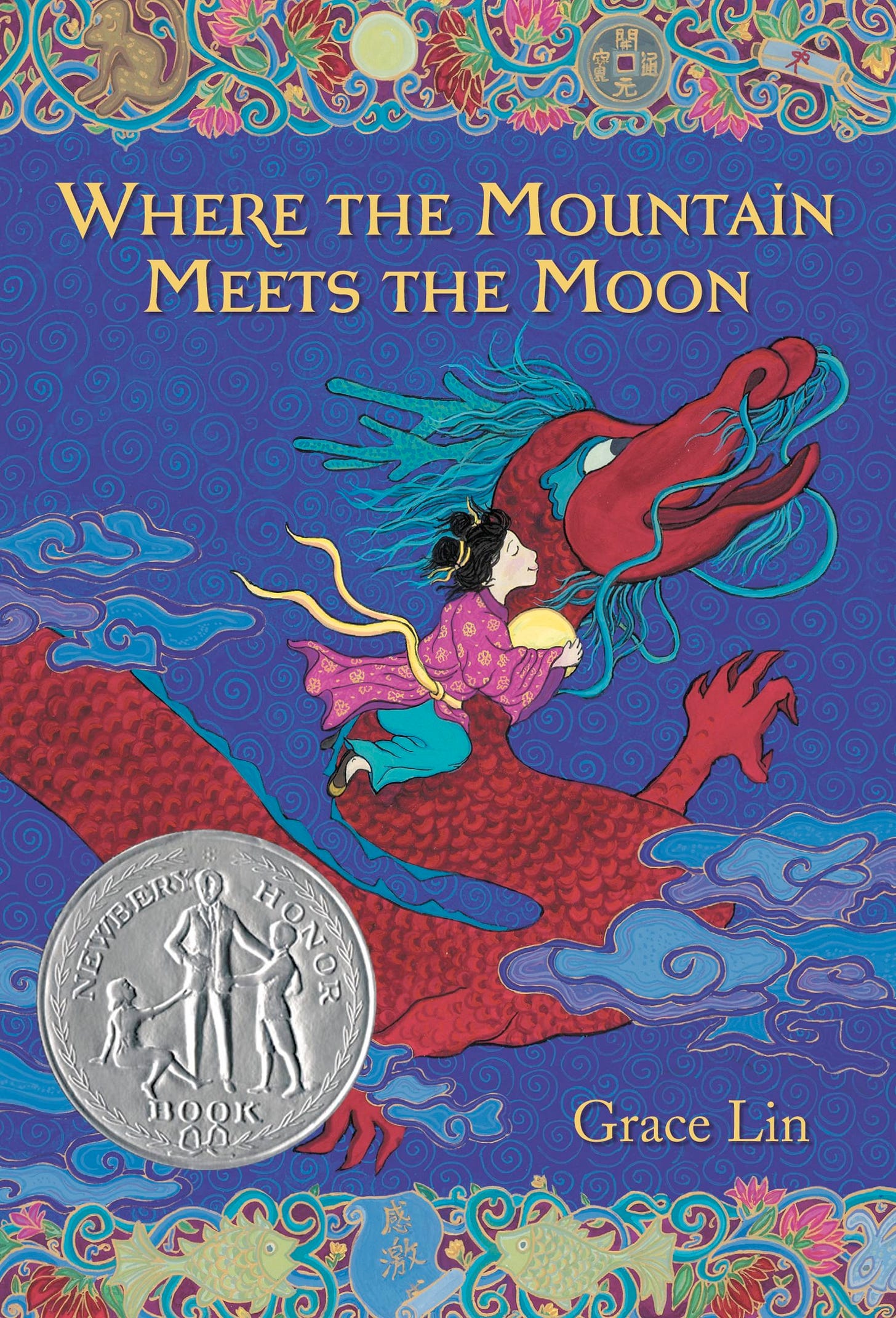Meet Mia Yang: Dreamer, front-desk clerk, 10-year-old
Dana Gaskin Wenig on Kelly Yang's "Front Desk", our Sustaining Book for September
Each month, writer and children’s book expert Dana Gaskin Wenig chooses an enduring children’s book or new classic to explore in depth. This month, she checks in to the Calivista Motel, located five miles — and a million light years away — from Disneyland. Come on in. Dana will tell you all about the adventures of Mia Yang, Mia's parents, and the 24-hour parade of friends, villains, and heroes who complicate and enrich their lives.
Mia Yang, the heroine of Kelly Yang’s Front Desk (2018), is a ten-year-old girl who carries the world on her small shoulders. Like many recently arrived immigrants to the United States, Mia thought she and her parents were moving someplace, “where we could live in a house with a dog, do whatever we want, and eat hamburgers till we were red in the face.”
Instead, they end up needing to live in their car for a short time until they find work in a Chinese restaurant. When the restaurant owner hires Mia as a waitress, too, (even though she is underage), things don’t work out and the whole family is out of work and a place to live.
‘You can’t use the pool, kid’
Soon Mia’s mom finds another situation for them — managing the Calivista Motel in Anaheim, California, which has a sign outside that says, “Disneyland — just five miles away.” The position comes with a small apartment for the family, behind the front desk where arriving guests can wake them 24 hours a day. They soon find out that the owner of the hotel, Mr. Yao, is not the helpful person he first appears to be. Mia runs the front desk while her parents work long hours cleaning the rooms and washing piles and piles of sheets and towels.
I read Front Desk in two days, not because I was in a hurry to review it, but because it’s a page-turner, and because there is something so special about how Yang tells this story. Technically this isn’t a memoir, but I can taste the truth in it. In the author’s note at the end of the book, Yang says, “I helped my parents manage several motels in California from when I was eight years old to when I was twelve years old.” But it’s not just that Yang is writing about what she knows, it’s that she is doing it in the voice, and from the perspective of, a child. If you’re a writer, you know this is hard to do, and she does it well.
Mia’s dream of going to Disneyland as a family is crushed when she hears Mr. Yao tell her parents that one parent must remain in the motel at all times. Then Mr. Yao says, “You can’t use the pool, kid. . . then all the customers will want to use the pool.” Her first customer is one of the motel’s weekly guests, people who live at the motel and pay by the week instead of by the day. Hank, who Mia describes as “a thin African American man about fifty or so years old,” becomes extended family over time, as do other weekly guests.
Mia experiences, and witnesses, prejudice and racism, as well as friendship and encouragement. She meets the injustices she encounters by thinking up practical solutions and following through on them. She works hard on her writing skills, because improving her writing helps her get things done! She borrows a dictionary-thesaurus from one of the weekly guests and writes letters to motel guests and friends, eventually writing letters on behalf of others that help them immensely.
She’s highly motivated and deeply determined, and she combines these qualities with her friend Lupe’s encouragement (“You can’t win if you don’t play”) to make good things happen, not just for herself and her family, but for everyone she touches.
Of course, she is also ten (and a human being), so she also makes mistakes, is confused at times, and sometimes her best efforts are thwarted by the people she loves the most, like when her mother tells her she should just focus on math, because “‘You just can’t be as good as the white kids in their language, honey. It’s their language.”
A sense of practical idealism
The Calivista becomes a safe place for recently arrived Chinese immigrants needing a place to stay for a few days and a meal. They are often searching for a better situation or escaping from a very bad one. The Tang family shares what they have, listening to their stories and enjoying familiar foods together. Mia calls each of them “aunt” and “uncle,” and the Tangs hide them in unused rooms for short periods of time, always afraid that the owner will discover what they are doing.
The author's note offers background on the situation for immigrants from China to the U.S. at that time: “There were 536,000 immigrants from mainland China living in the United States in 1990. Unlike the Chinese immigrants who came before them, the post-1965 Chinese immigrants were predominantly skilled. They were highly educated, leaving behind good careers. They took a bet that China was not going to change. They were wrong.”
The Calivista Motel is in a diverse neighborhood and Mia’s adventures show how the various groups work with and against one another at different times. The ensemble cast of this book is a varied collection of people, some of whom are clearly in it for themselves, others who are working for the benefit of everyone.
This is the America of the 1990s for people living in poverty and persons of color, many of them immigrants. Difficult themes including violence, racism, and extortion, exist alongside kindness, respect, and direct action. I came away from this book deeply moved by the practical idealism and deep sense of community responsibility this story offers.
A best friend with a secret
Slight spoiler alert …
When Mia first meets Lupe (short for "Guadalupe") at school, they tell each other storybook versions of their lives including golden retrievers, summer vacations, and swimming pools and trampolines. Their friendship really begins to blossom, though, when a chance encounter requires that they acknowledge the truth of who they are and where they come from. It turns out Lupe is also an immigrant, undocumented, though her family is working toward getting papers.
This story is about the real dangers of living without a social safety net. About calling the police and watching them make things worse instead of better. About the daily racism toward, and between, all the different groups. About what it’s like to go to school and feel ashamed of your reality at home or be bullied by other students. For many families, there will be something familiar here, and if there isn’t, this book offers up a rich learning opportunity, an interconnected view into the lived experience of so many people in this country and beyond.
This book is winner of the 2019 Asian/Pacific American Award for Literature, Parents’ Choice Gold Medal Fiction Award Winner, and named Best Book of the Year by the Washington Post, Publishers Weekly, Kirkus Reviews, NPR, Booklist and many more.
Kelly Yang has gone on to write many more books for children, some in the YA genre, and founded The Kelly Yang Project, an educational organization that “knows that the single most important skill your child can learn is to communicate effectively. We focus on critical thinking, writing training, and confident public speaking.”
Big thanks to Rene, the head children’s book buyer at Third Place Books here in the Seattle area for recommending this book to me. It really moved me. The Tang family’s story, a story about what it is to be an immigrant to the US, is rarely told, and often not by the people who experience it. The book is suspenseful at times, but it’s not too much for a child who is ready for a chapter book.
Again from the author’s note at the end of the book, Yang says she hopes
“that through this book, more people will understand the importance of tolerance and diversity. The owner of one of the motels we managed told us not to rent to African Americans, saying they were dangerous. This infuriated us, and we did not listen. To this day, my family and I are forever grateful to the many, many wonderful people from all different backgrounds who made us feel welcome in our new country and helped us in times of need.”
She adds that, “Often during tough times, the first instinct is to exclude. But this book is about what happens when you include, when, despite all your suffering and your heartache, you still wake up every morning and look out at the world with fresh, curious eyes.”
First in a series
Front Desk is the first in a series of four books.
In the second, Three Keys (2020), Mia is in sixth grade and runs the front desk at the motel with Lupe. She has a different teacher now, and she’s worried about a new immigration law that will threaten the carefully balanced life she has built to keep her friends and family safe.
In book number three, Room to Dream (2021), Mia and her family finally go back to China for a vacation. The dynamics between her and her friends are changing, and small businesses near the motel are disappearing as big, new buildings are going up.
The fourth book in this series, Key Player, came out September 6, 2022! It’s focused on soccer—the U.S. is playing China in the Women’s World Cup in Southern California. As always, Mia has a plan, this time for how to cover the game to win a spot at journalism camp. And as usual she will face discrimination, prejudice, and her own fears to get it done.
Kelly Yang’s smart, kind books join Grace Lin’s Where the Mountain Meets the Moon (2010), a Newbery Honor winner; and Japanese-American author Cynthia Kadohata’s Kira-Kira (2005), which won the Newbery Award, and a short list of others.
They represent a welcome wave of children’s books written by Asian-American and Pacific Islander (AAPI) authors that first entered the world of publishing in the U.S. beginning in the late 90s and early 2000s.
Evidently, we cannot hear the messages of books like this often enough. Last year, a family in New York tried to get Yang’s Front Desk banned on the premise that the book actually teaches racism/critical race theory. (The book was pulled from classrooms in the middle of a class, then reinstated after students protested the banned books list that included it. Parents are now able to opt out for their child.) The accusation seems bizarre given the book's messages of grit, tolerance, and love.
We are a beautiful multitude
Representation in children’s literature, and fair access to publishing, is slowly changing in the U.S. Thankfully so, because reading books to our children written by a broad selection of the human community teaches tolerance. Kelly Yang, on this topic, says, “This country is made of all sorts of different people, and you go to school to learn how to deal with the world and interact with people from all walks of life, different ethnicities … so I always think it’s great when kids can read a book about someone whose life is a little bit different and learn compassion and understanding."
A diverse collection of books on the read-aloud shelf gives us a true picture of the world we live in and the beautiful multitude of people who share it. One of the many gifts of reading aloud is that it gives us an opportunity to share the broadest and most welcoming view of who in the world we are, and to patiently attend to the inevitable questions about the world that will arise. I hope you enjoy Front Desk as much as I did.
Catch up quickly so you can read Key Player!
Dana Gaskin Wenig is a writer, writing teacher, and former bookseller. She lives in the Seattle area.
320 Sycamore Studios is a children’s book publisher. Visit our Bookshelf page to read our stories for free. Books are also available for purchase on Amazon.










